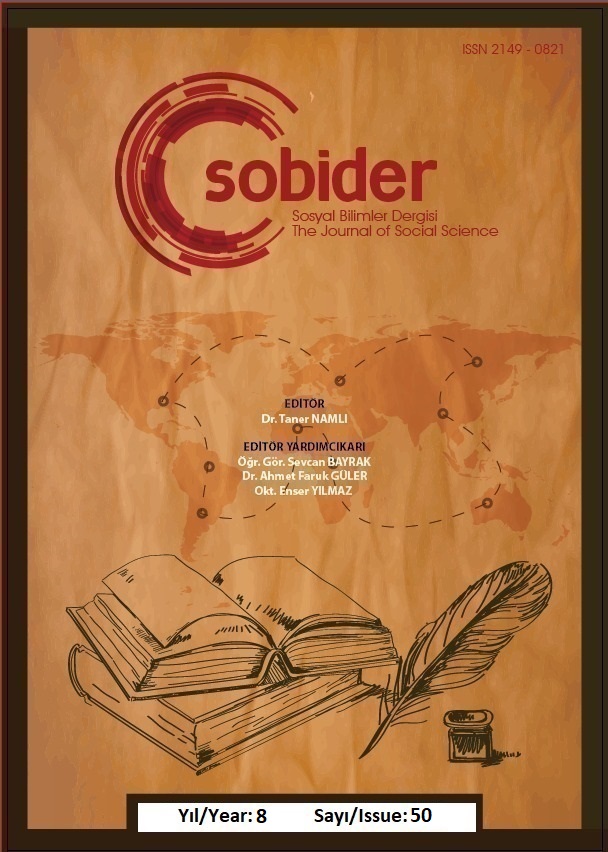Author :
Abstract
Ulus devletlerde yeni bir konumda ele alınan ve ulus devletlerin temeline yerleşen yurttaşlık, kendisini önceleyen Antik Yunan polisleri, Roma dönemi, Orta Çağ kent devletleri ya da monarşik yapılanmalardaki yurttaşlık anlayışından oldukça farklıdır. Ulus devlette yurttaşı tarihsel olarak adı geçen dönemlerden ayıran temel özellik ise, yurttaşlığın yöneten yönetilen ekseninde, hem yasayı kendisinin ürettiği hem de kendisinin ürettiği bu yasaya tabi olduğu bir düzlemde yeniden ele alınmış olmasıdır. Yani yöneten ile yönetilen arasındaki ilişki, karşılıklı sorumluluk esasına dayalı olarak ikili bir konum oluşturur; siyasal iktidar ve toplum. Bu ilişki biçimi de tarihsel olarak bir imtiyaz sahibi olmak anlamına gelen yurttaşlık düşüncesini kökünden değiştirmiştir. Artık bir ulus devlete siyasi olarak bağlı olan herkes, eşitlik ilkesi gereğince iktidarın gerçek sahibi olarak halktır ve halk burada homojen bir birliktelik olarak ele alınır. Bu makalede toplumsal farklılıklar söz konusu olduğunda ulus devlet düşüncesinin eşit yurttaşlık ilkesine göre yaşadığı yapısal sorunlara değinilmiştir.
Keywords
Abstract
The matter of citizenship that is being addressed in a new dimension in nation states and that is embedded to the core of nation states is much different than the previous citizenship concepts that were seen in ancient towns of Greece, Rome, city-states of medieval era or in the monarchical structures. And the main difference separating a nation-state citizen from those in the past is the fact that citizenship has been re-addressed in the axis of ruler-ruled and in a plane where the citizen not only produces the law but is also subjected to this law. So the relation between the ruler and the ruled establishes a double-sided dimension based on the principle of mutual responsibility and the two sides of this dimension are the political power and the society. This form of relation has completely reshaped the idea of citizenship which historically means to have a privilege. Once a nation is politically bound to a nation-state, the principle of equality requires that the actual owner of power is the people and people here is defined as a homogenous unity. This article dwells on the structural issues faced by the nation-state idea with regards to the societal differences.
Keywords
- Ağaoğulları M.A. (1989) Fransız Devrimi’nde Birey Devlet İlişkisi, Ankara Üniversitesi SBF Dergisi cilt.44 sayı.3 (Erişim Tarihi:24.05.2018) http://dergiler.ankara.edu.tr/dergiler/42/453/5110.pdf
- Ağaoğulları, M.A( 2010). Ulus Devlet Ya Da Halkın Egemenliği, Ankara: İmge Kitabevi Yayınları.
- Bahambra K.G. (2015). Moderniteyi Yeniden Düşünmek, Post Kolonyalizm Ve Sosyolojik Tahayyül, (Ö. İlyas, Çev.). İstanbul: İstanbul Bilgi Üniversitesi Yayınları.
- Balibar, E. (2016). Yurttaşlık (M. Erşen, Çev.). İstanbul: Monokl Yayınları.
- Brubaker W.R. (2009). Fransa Ve Almanya’da Vatandaşlık Ve Ulus Ruhu,(V. Pekel, Çev.). Ankara: Dost Kitabevi
- Calhoun, C, (2014). Kimlik Ve Tanınma Politikası, Kimlik Politikaları, Tanınma, Özdeşlik ve Farklılık içinden, (F. Mollaer, Edit., B. Helvacıoğlu vd. Çev.). Ankara: Doğubatı
- Calhoun, C. (2009). Milliyetçilik, (B. Sütçüoğlu, Çev.). İstanbul: İstanbul Bilgi Üniversitesi
- Gellner, E. (2015). Milliyetçiliğe Bakmak, (S. Coşar, S. Özertürk, N. Soyarık Çev.). İstanbul: İletişim Yayunları.
- Giddens, A. (2008). Ulus Devlet Ve Şiddet, (C. Atay, Çev.). İstanbul: Kalkedon Yayınları.
- Gülalp, H. (2007). Vatandaşlık Ve Etnik Çatışma, Ulus Devletin Sorgulanması, İstanbul: Metis
- Heater, D. (2007). Yurttaşlığın Kısa Tarihi, (M. Delikara, Çev.). Ankara: İmge Kitabevi.
- Hobbes, T. (2004). Leviathan, (S. Lim, Çev.). İstanbul: Yapı Kredi Yayınları.
- Hobsbawm, E. J. (2014). Milletler ve Milliyetçilik, Program, Mit, Gerçeklik, (O. Akınhay, Çev.). İstanbul, Ayrıntı Yayınları.
- Kadıoğlu A. (2012). Vatandaşlığın Dönüşümü, Üyelikten Haklara İçinden “Türkiye’de Vatandaşlığın Anatomisi, (Hzrl, A. Kadıoğlu, C. Cemgil, Çev.). İstanbul: Metis
- Kaya, A. (2000).Yurttaşlık, Azınlıklar ve Çokkültürlülük, Yurttaşlık ve Toplumsal Sınıflar, (A. Kaya. Çev.). Ankara: Gündoğan Yayınları.
- Pierson, C. (2011). Modern Devlet, (N.Kutluğ, B. Erdoğan, Çev.). İstanbul: Chiviyazıları Yayınevi.
- Poggı, G. (2007). Modern Devletin Gelişimi-Sosyolojik bir Yaklaşım, (Ş. Kut, B. Toprak, Çev). İstanbul: İstanbul Bilgi Üniversitesi Yayınları.
- Taylor, C. (2006). Modern Toplumsal Tahayyüller, (H. Koyukan Çev.). İstanbul: Metis
- Thiesse, A. M. (2010). Ulusal Kimlikler Ulusaşırı Bir Paradigma, , “Milliyetçiliği Yeniden Düşünmek” içinden, (Der. Diechoff, A., Jaffrelot, C, D. Çetinkasap, Çev.) İstanbul: İletişim Yayıncılık.
- Vega, A. J. (2011). Aydınlamanın Farklılıkları, Bugünün Kimlikleri, (G. Aksay, Çev.). İstanbul: İş Bankası Yayınları
